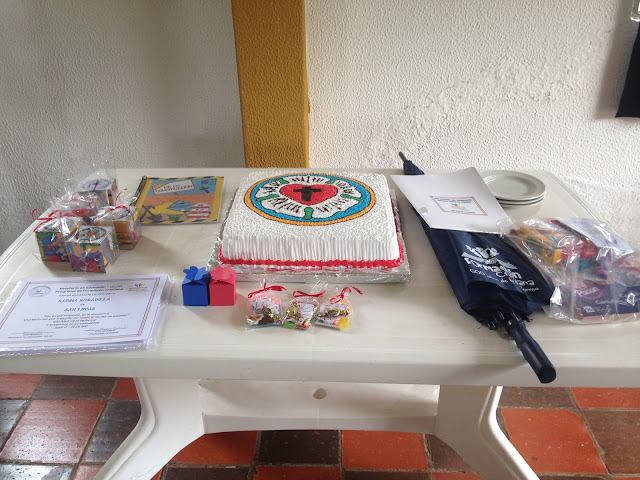There was so much energy, learning, laughter and renewal that happened, all focusing on the Reformation ways we live our identity as Lutherans. Pictured above was one of the opening sessions led by Pastor Carlos Negron from Puerto Rico. He led all the musical parts.
Pastor Angelica is leading the part 'Liberating Education', teaching the group what Luther had to say about education (a lot) and the importance of the way we teach. We also studied the 3 'solas' (Word Alone, Faith Alone, Grace Alone [sometimes Christ Alone is included, but for this retreat we did not have a separate study]). Each topic was led by a different member of the Christian Formation team, Pastor Angelica has been (and will continue to be) the pastoral adviser.
Sunday evening puppets was led by Jose Arturo Vega from Peru. The group had a great time relaxing a bit after two intense days of workshops and learning. Pictured here, left to right: Cristina Pineros, Carlos Negron, Betty Castelblanco, Carolina Castellanos, Edilberto Chaparro, and Pilar Gonzalez. As you can see, everyone enjoyed making puppets and every puppet was very creative.
At the closing of the retreat Monday afternoon we had cake, again to celebrate the 500th anniversary of the Reformation. Pictured above are the certificates all the participants received, some gift bags for various activities, an umbrella with the Christian Formation logo, a folder of the material for the retreat, and a package of material for each congregation - which was brought from Mt Olive in Rochester, MN when they visited Colombia in March.
Here is the team that made the whole thing happen! Christian Formation is made up by a regional coordinator from each of the four regions of IELCO. During the weekend there were also elections for the new coordinators. Above is the picture of the new team (and a few editions for the weekend). Left to right, Mauricio Chala, newly elected to be one of the coordinators in the central region, Pastor Atahualpa Hernandez, Pastor Angelica Bernate - pastoral adviser, Belky Hernandez, coordinator for eastern region, Sara Lara - coordinator of Human Rights (lead a session about the rights of children), Carolina Varon - coordinator for southern central region, Stella Gonzale - coordinator for nothern central region, Judith Leon - coordinator for plains (llanos) region, me, Zulma Ojeda - national coordinator, and Miguel Parada newly elected coordinator for the Boyaca region. Photo by Jorge Diaz.
And the whole group! A great weekend was had by all, friendships made, a lot of learning, and a renewed calling to teach! Photo by Jorge Diaz.















